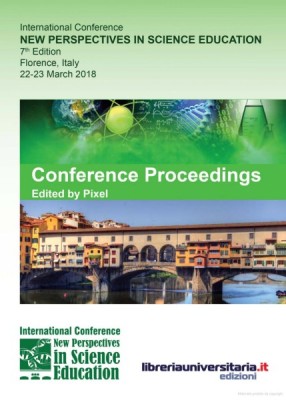Category: STE(A)M education
Published: 23/03/2018
Proceeding: New Perspectives in Science Education - LibreriaUniversitaria
Authors: Tramonti M.; Tramonti L.

The International surveys, such as TIMSS 2015 (Trends in International Mathematics and Science Study) show how does evolve the students performance in scientific subjects in some European countries, like Italy, are under the OECD average compared to other technologically advanced countries, mainly from Asia. Significant is the gap in the understanding between the more “real” geometry and the “abstract” algebra. The causes can be found in low incentives that students receive from the current teaching methods. According to the current theories, student’s motivation is directly proportional to their ability to understand the topic studied. The motivation activates even the self-assessment ability that promotes the performance improvement further in the learning process and increases student’s interest in dealing also with difficult scientific concepts to be learnt.
However, due to the subjective student features, current teaching approaches are, sometimes, similar to the black box model, where are known the results, but unknown the processes implemented to reach them.
Therefore, teaching approaches should be more centered on student’s needs and less being a systematic process focused only on the memorization of theorems enunciation and formulas to be applied. For example, in the case of mathematics study, the true knowledge occurs when it is possible to extract it from another context in which it is more visible, i.e. the mathematical concepts become vividly contextualized. This means that its learning is essentially facilitated when the concepts to be studied are learnt in relation with other subjects such as biology, art or philosophy, because this allow students to “visualize” and “concretize” better the mathematical abstractions. In this context the paper intends to describe an innovative approach referred to the theory of variability, key aspect in the Singapore’s method for mathematics study, by demonstrating, further, the added value of the interdisciplinarity and multidisciplinarity based on the absolute bonding existing between humanistic and scientific subjects where the same concepts are represented in different forms.
Keywords: Mathematics education, learning by doing, problem solving, technology-enhancing learning.
How to cite this paper:
Tramonti, M. & Tramonti, L. (2018, March). Facilitating Science Learning through a Multidisciplinary Approach. In New Perspectives in Science Education 7th Edition 2018 Conference Proceedings. LibreriaUniversitaria.
 The International surveys, such as TIMSS 2015 (Trends in International Mathematics and Science Study) show how does evolve the students performance in scientific subjects in some European countries, like Italy, are under the OECD average compared to other technologically advanced countries, mainly from Asia. Significant is the gap in the understanding between the more “real” geometry and the “abstract” algebra. The causes can be found in low incentives that students receive from the current teaching methods. According to the current theories, student’s motivation is directly proportional to their ability to understand the topic studied. The motivation activates even the self-assessment ability that promotes the performance improvement further in the learning process and increases student’s interest in dealing also with difficult scientific concepts to be learnt.
The International surveys, such as TIMSS 2015 (Trends in International Mathematics and Science Study) show how does evolve the students performance in scientific subjects in some European countries, like Italy, are under the OECD average compared to other technologically advanced countries, mainly from Asia. Significant is the gap in the understanding between the more “real” geometry and the “abstract” algebra. The causes can be found in low incentives that students receive from the current teaching methods. According to the current theories, student’s motivation is directly proportional to their ability to understand the topic studied. The motivation activates even the self-assessment ability that promotes the performance improvement further in the learning process and increases student’s interest in dealing also with difficult scientific concepts to be learnt.